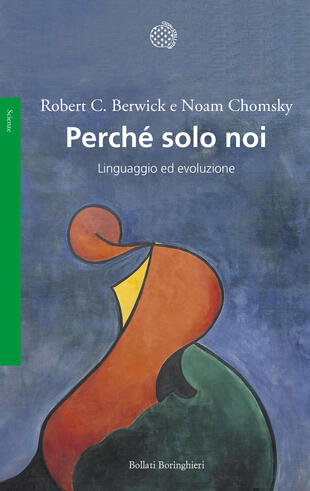

Sinossi
«Spiegare le origini di ciò che è unico è una vera impresa. Berwick e Chomsky ci riescono magistralmente riguardo alla più straordinaria unicità umana, il possesso del linguaggio, mostrando con finezza la semplicità del meccanismo sottostante»
Ian Tattersall
Solo noi possediamo lo strano oggetto biologico chiamato «linguaggio». Noi e nessun’altra specie animale, compresi i primati non umani, visto che uno scimpanzé non sfiora neppure le capacità sintattiche di un bambino di tre anni. Il linguaggio è l’unicità più intrigante ed enigmatica in cui si sia mai imbattuto chi studia l’animale uomo, quella che ha avuto effetti incalcolabili sulla nostra vicenda. Da lungo tempo stuoli di scienziati delle più varie discipline e dei più diversi orientamenti sono alla ricerca delle sue origini; un’avventura intellettuale in cui si incrociano spade e si mettono in campo saperi sofisticati, sempre di nuovo riarmati in una tenzone senza fine. Un vero rovello soprattutto per l’evoluzionismo, alle prese con un «salto» che ne sfidava la tradizionale impostazione gradualistica.
Oggi però molto è cambiato, perché negli ultimi venticinque anni abbiamo appreso sulle basi neurofisiologiche e genetiche del linguaggio più che nei secoli precedenti, mentre i biologi evoluzionisti sono approdati, con strumenti matematici, a interpretazioni stocastiche del cambiamento evolutivo.
Dall’analisi di queste risultanze ripartono Noam Chomsky, supremo teorico della grammatica universale innata, e il linguista computazionale Robert Berwick, tra i maggiori studiosi dell’apprendimento vocale negli uccelli canori. La loro tesi, insieme evoluzionistica e discontinuistica, è un punto di arrivo nel dibattito sull’argomento: il linguaggio sarebbe un’acquisizione recente, ossia databile all’incirca a 80000 anni fa, quando, in una stretta finestra temporale, un gruppo di ominidi africani subì un piccolo ricablaggio del cervello che consentì le operazioni fondamentali del pensiero, in seguito esternalizzate attraverso il sistema sensomotorio. Come strumento interno per il pensiero, dunque, e non per necessità di comunicazione – ritenuta insufficiente a esercitare un’adeguata pressione selettiva – avremmo prodotto la strabiliante capacità di assemblare gerarchicamente la struttura sintattica, esclusiva di noi umani.
- ISBN: 883397491X
- Casa Editrice: Bollati Boringhieri
- Pagine: 184
- Data di uscita: 06-10-2016
